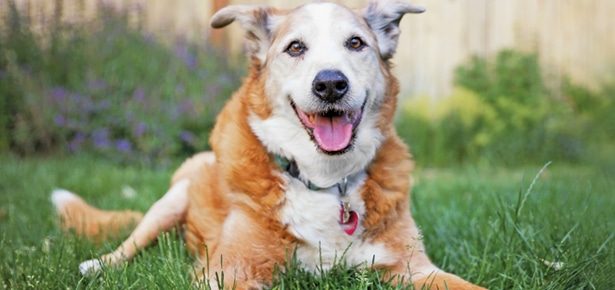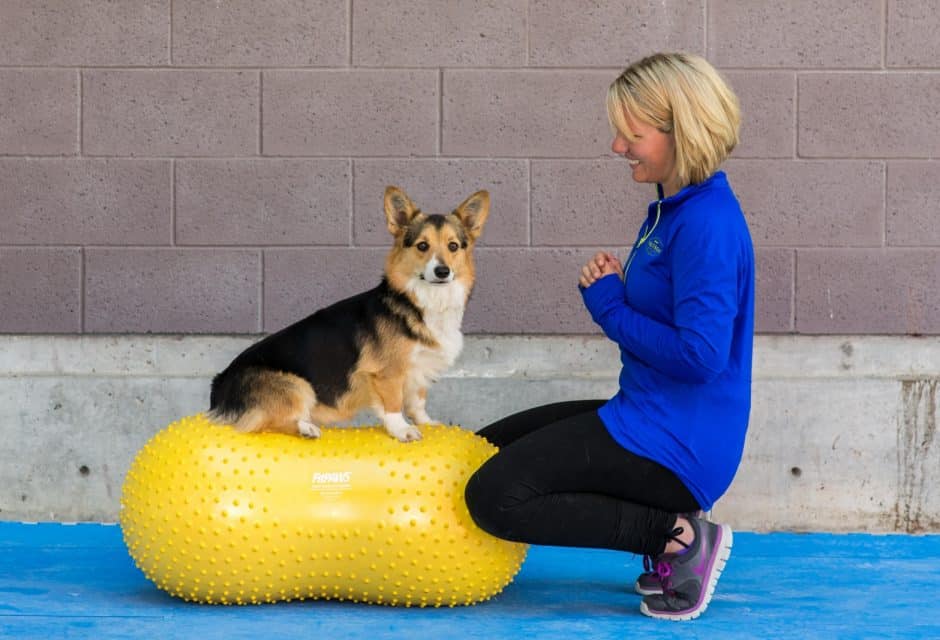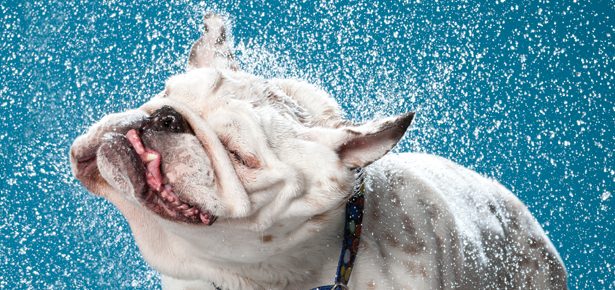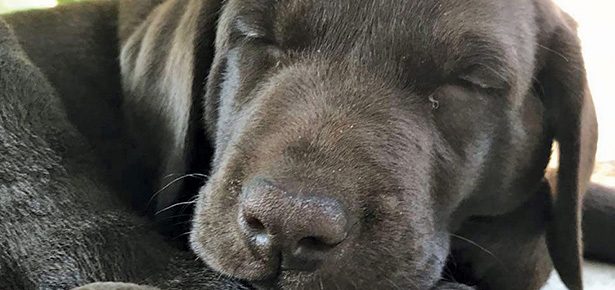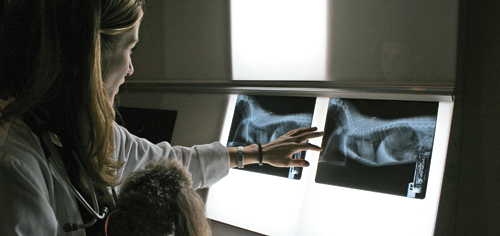
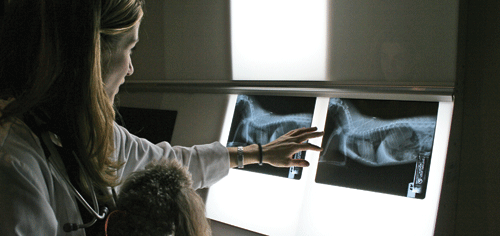
High-Tech Vets: Better Pet Healthcare
Special Treatment: The latest in health care for dogs
THE SMALL BROWN POODLE BEGAN TO TURN BLUE AS HE FELL INTO SEDATION, his instinct to gasp for air temporarily dulled by drugs. Earlier X-rays had revealed a mass hanging from his tonsil; only the tiny remaining space lay between life and death. With the large tumor blocking the dog’s airway, Drs. Tatjana Mirkovic and David Francis worked calmly but quickly, searching for a path for the air tube.
The tube finally slides in, and a sigh of relief breathes through the four-person team working on the dog. With the tube now carrying air to the lungs, he is breathing better than he has in months. Mirkovic and Francis decide their best course of action is to remove the tumor. After some delicate surgery, it comes out, the size of a cherry tomato.
This Poodle is one of thousands of animals visiting Vancouver, British Columbia’s Canada West Veterinary Specialists and Critical Care Hospital (known as Canada West) each year. In 2006, the 50-bed hospital saw about 11,000 patients. Approximately 75 percent were dogs.
Potential patients must first receive referrals from family veterinarians. More than 400 veterinary clinics refer their clients to Canada West from a region that spans British Columbia, Yukon, Alaska, and Washington.
"We lend our knowledge when general practitioners are at a loss or when the repair is beyond their scope," says Dr. Loic Legendre, Canada West’s dentistry wizard, as he prepares to outfit a Royal Canadian Mounted Police dog with crowns he fashioned using an alloy containing palladium. The German Shepherd’s two upper canines have worn down during his years on the job.
Along with dentistry, Canada West offers specialized medicine in neurology and dermatology, skilled orthopedic surgeons, cancer treatment, human-grade diagnostics such as CT scans, radiographs, ultrasounds, and MRIs, and around-the-clock emergency care for animals in critical condition.
Dr. Kimberly Barron of Bellingham, Washington, frequently refers clients to Canada West.
"My clients have all had good experiences there, even if they had to put their dog down," says Barron, owner of Northshore Veterinary Hospital. "I am so thrilled with their bedside manner, and especially their communication with me. They are phenomenal. And it’s so convenient to have all the specialists in one place."
Animals are sometimes examined by several teams of specialty veterinarians and their assistants while they are at Canada West for diagnosis and treatment. A steady stream of dogs arrives with their owners and a few come by private ambulance. They receive care for trauma following household or car accidents, treatment for chronic or serious conditions, and might undergo complicated surgeries such as hip replacements.
At Canada West this particular week, two Rottweilers, a Boxer, a Golden Retriever, a Mastiff, and a Beagle are wheeled into surgery for various leg and knee injuries. Also present are a Coton de Tulear with back pain, and a Border Collie who, having been run over by a trailer, has multiple pelvis fractures and a ruptured bladder. A friendly Labrador and a fractious orange cat arrive for their regular appointments to receive chemotherapy for cancer.
Though people have been helped by specialists for generations, this is an emerging industry in veterinary medicine. In the past, veterinary specialists were traditionally attached to universities and other veterinary schools. They were mainly teachers, and accessible only to determined, passionate pet owners. Sometimes they were called upon to treat valuable prize-winning animals such as Thoroughbred horses.
Specialists began going into private practice in the late 1980s and early 1990s, says Shawn McVey, a partner in Veterinary Specialists in Private Practice (VSIPP), an American company that organizes an animal conference for these specialists. Now half of the specialty graduates are going straight into private practice, says McVey, who also happens to be CEO of Eye Care for Animals, a 24-clinic chain offering ophthalmology.
VSIPP reports there are about 325 to 350 veterinary specialty clinics across Canada and the U.S. To be counted, a clinic must have two or more board-certified veterinary specialists on staff.
Ten years ago, Canada West was started by a group of young veterinarians already linked by a common drive to specialize. Drs. Alan Kuzma and Terri Schiller, two of the five partners, were mobile surgeons for years. They travelled from clinic to clinic in their cars loaded with surgical instruments, each performing two to four surgeries a day. Both knew they could offer their patients better care by opening their own clinic.
"You had no control," Kuzma says. "Sometimes there were bad operating rooms, and [assisting] technicians might not be trained for advanced surgery. There was no control over the care of the patient afterwards. We would leave and hope for the best."
Kuzma and Schiller teamed up with Dr. Laurence Braun, whom they got to know while she worked at the Vancouver Animal Emergency Clinic. Braun showed great finesse and devotion tending to critically ill patients, a vital component of Canada West’s services. Patients might spend some time in intensive care during their stay here, and a 24-hour watch sometimes makes the difference between life and death. Dr. Greg Starrak joined the group with his already successful diagnostic imaging practice. The fifth partner, Dr. Nick Sharp, is an acclaimed neurologist and neurosurgeon who joined the practice in 2002. (There are just 138 veterinary neurologists in North America, and Sharp is one of only two board-certified in neurosurgery also.) Today Canada West has 100 employees, 22 of them veterinarians. The clinic never closes, and three shifts of staff float in and out day and night treating animals in need.
Staff report that they face some of the same challenges as nurses working a pediatric ward-dogs can’t communicate verbally, so they must be watched closely for clues as to their dispositions.
"They can’t tell you how they’re feeling," says Nicole Jameson, hospital coordinator. "We have to figure it out. This place attracts people who have a desire to learn. It’s the most amazing adrenalin high you can imagine, saving an animal."
Because the hospital treats many critical cases, inevitably all endings aren’t happy ones. The clinic’s morgue is a testament to this. Two rows of brown paper bags are lined up on the countertop, each with a loved animal’s name written on it. Every bag contains an urn with ashes, one final paw print in clay, and a card personalized by the staff members who cared for the animal during his or her stay at Canada West.
"It can be heart-wrenching to see people in pain face letting go," says Jayne Robertson, coordinator of the intensive care unit. "There are huge emotional connections between people and their pets-the pet has seen them through things such as illnesses, and sometimes they are closer to the pet than their [human] family."
In addition to compassion and skilled care, one of the clinic’s keynotes is cleanliness. Just a few dust motes can compromise a sterile environment during surgery and contribute to post-operative infections, so the four operating suites are scrubbed clean following each procedure (including the walls and ceilings). An in-house disinfectant team roams seven days a week to stamp out diseases that might be lingering in the hospital. An internist swabs random surfaces and submits samples to a laboratory for testing. One employee is devoted solely to sterilizing instruments. Brian Cutteridge packs them up in blue surgical cloth bundles securely taped and bearing the particular surgeon’s initials. The bundles aren’t opened until the procedure is ready to begin in a sterile operating theatre.
These advancements are expensive. In June 2005, Canada West upgraded from a 6,000 square-foot facility to its current 17,000-square-foot location nearby. Kuzma says outfitting the new clinic cost $2.5 to $3 million, including leasehold improvements and surgical and diagnostic equipment. Some medical diagnostics machines cost "more than six figures," and the building is equipped with many extras, such as lines that snake through various operating and procedure rooms carrying oxygen and medical air for patients, and nitrogen to power equipment.
In Canada, "we are not aware of medical costs for ourselves," Kuzma says. "There can be sticker shock." American clients used to pay-per-use medicine are more prepared for the cost of human-grade care provided by Canada West, Kuzma says.
Owners can expect to pay $1,000 for a day of diagnostic tests if the condition is serious. Surgery to repair a broken leg might cost $3,500, or even $10,000 and up if two or three legs are broken and internal injuries are complicating the trauma.
Laura Clark, community outreach director for Whatcom Humane Society in northern Washington State, brought her dog, Jesse, to Canada West this past spring for respiratory problems. Unfortunately, her affliction wasn’t curable.
"It was worth it-we would have mortgaged our house to take care of our animal," Clark says. "We were impressed with the skill of the doctors. They couldn’t fix it, but they could answer our questions."
Others who brought their dogs to Canada West also rave about their experiences. Last fall, Bellingham resident Michelle Snow-Waltz and her husband Kevin Waltz brought Toby to the clinic for cruciate ligament surgery. The seven-year-old Newfoundland Retriever mix blew out his knee chasing birds, rendering the 140-pound dog lame. Dr. Mark Smith cancelled his weekend plans to perform Toby’s operation. Several years ago, the Waltzes also brought their cat, Eddie, to Canada West. He was blind and diagnosed with a brain tumor. Eddie did not survive, but Toby has recovered beautifully.
"They bend over backwards to provide above and beyond what they need to," Snow Waltz says. "You can be sure the animals are getting the best care money can buy."
Clark agrees. "Even though we had to go there under bad circumstances, at least the doctors were there for us."
Schiller says that with every case, Canada West has three clients: the referring veterinarian, their human client, and of course, the patient.
A visit to Canada West can be a scary experience for some people already fearing the loss of their companion animal, so the hospital tries to minimize distress, says Sharon Brown, hospital administrator. The spacious, elegant waiting room has no ringing phones. Those are answered in another room: both the client calling in and the customer coming through the doors get the full focus of the staff during a difficult and stressful time.
"You experience the deepest grief to the greatest joy," Brown says. "It’s a magical place to work. Where else do you get to see miracles every day?" ■
Carreen Maloney was a journalist in Canada for 10 years at the Ottawa Citizen, the Winnipeg Free Press and Business in Vancouver. She has rescued animals for 15 years. She writes about animals and runs Fuzzy Town, a U.S.-based toy and pet products company. She can be contacted at carreen@fuzzytown.com.
Join the newsletter and never miss out on dog content again!
"*" indicates required fields
By clicking the arrow, you agree to our web Terms of Use and Privacy & Cookie Policy. Easy unsubscribe links are provided in every email.

